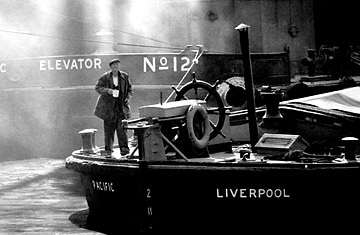
A still from Terence Davies' documentary, Of Time and the City.
(2 of 2)
And yet most children grow up believing that their home, school, place in society, however comfy or mean, is the norm — what else have they to compare it with? A man-child as perceptive as Davies can find honor and poignancy in the domestic chores of those days: feeding the fire, scrubbing the stoop, washing clothes by hand. Accompanying the images is a liturgical choir, consecrating the drudgery or, at least, sanctifying the memory. "And on Christmas Eve, pork roasting in the oven, the parlor cleaned, with fruit along the sideboard: a pound of apples, tangerines in tissue paper, a bowl of nuts and our annual, exotic pomegranate. Do you remember? Will you? Will you ever forget?"
He will never forget the almost aristocratic courtliness of the local soccer team, on those "slow Saturdays, when football like life was still played in black and white, and in shorts as long as underwear, when it was still not venal, when sportsmen and -women knew how to win and lose with grace and never to punch the air in victory." Or perhaps it was the strong bodies of the sportsmen that transfixed the young Terry. He realized he was different when he watched professional wrestling — or rather, the wrestlers: "O save me from those dark desires which thrill and compel: the world, the flesh and the Devil."
Feeling apart, alien, inferior, Terry was drawn to "Jimmy Preston, who was a real boy, and whom I envied; Jimmy Preston, who once put his hand on my shoulder, and I didn't want him to remove it." Homosexuality was not just a sin to Catholics; in Britain it was a crime. (Davies cites the condemnation of a judge about to sentence two gay men: "Not only have you committed an act of gross indecency, but you did it under one of London's most beautiful bridges.") But the need to be with another man was too strong to resist: "Caught between the Canon and the criminal law, I said goodbye to my girlhood." As he embraced forbidden love, he let go of Catholicism. "I was now a very happy, very contented, born-again atheist. Thank God!"
Anyone so deeply indebted to his youth will naturally be suspicious of change. In the '60s, the Beatles made Liverpool the world's pop-cultural Mecca, yet Davies sees "John, Paul, George and Ringo: as "not so much a musical phenomenon, more like a firm of provincial solicitors." The smooth crooners of the previous decade quickly faded, "the witty lyric and the well-crafted love song seeming as antiquated as antimacassars or curling tongs." As an appraiser of public buildings he is no less a conservative than Prince Charles. Davies rails against the New Brutalism, a style that incarcerated generations of the English working-class in structures of almost defiant ugliness. "Municipal architecture [is] dispiriting at the best of times," he dryly intones," but when combined with the British genius for creating the dismal, makes for a cityscape that is anything but elysian."
In Davies' adaptation of John Kennedy Toole's The Neon Bible, the central character says, "If you were different from anybody else in town, you had to get out." In one sense, Davies escaped his youth; in another, he keeps returning. And his imaginative understanding of it hits the viewer, even one who's never visited or cared about Liverpool, with the shock of recognition. Among the many snatches of poetry and pop songs in the film are these lines from T.S. Eliot's Little Gidding: "We shall not cease from exploration, and the end of all our exploring will be to arrive where we started and know the place for the first time." Through his artistry and honesty, Davies makes his childhood, his Liverpool, universal. His place is ours.
See the world's most influential people in the 2009 TIME 100.
